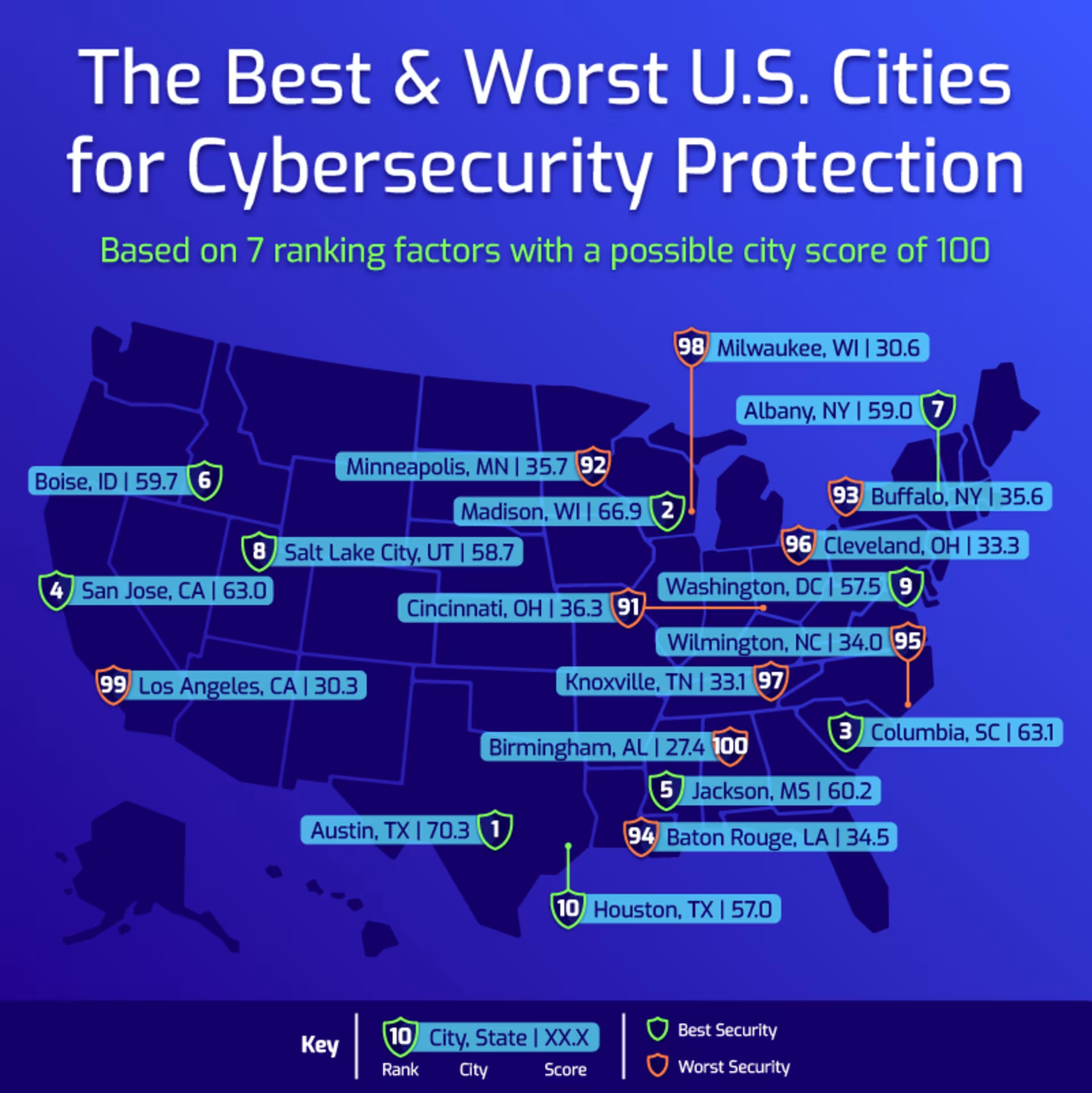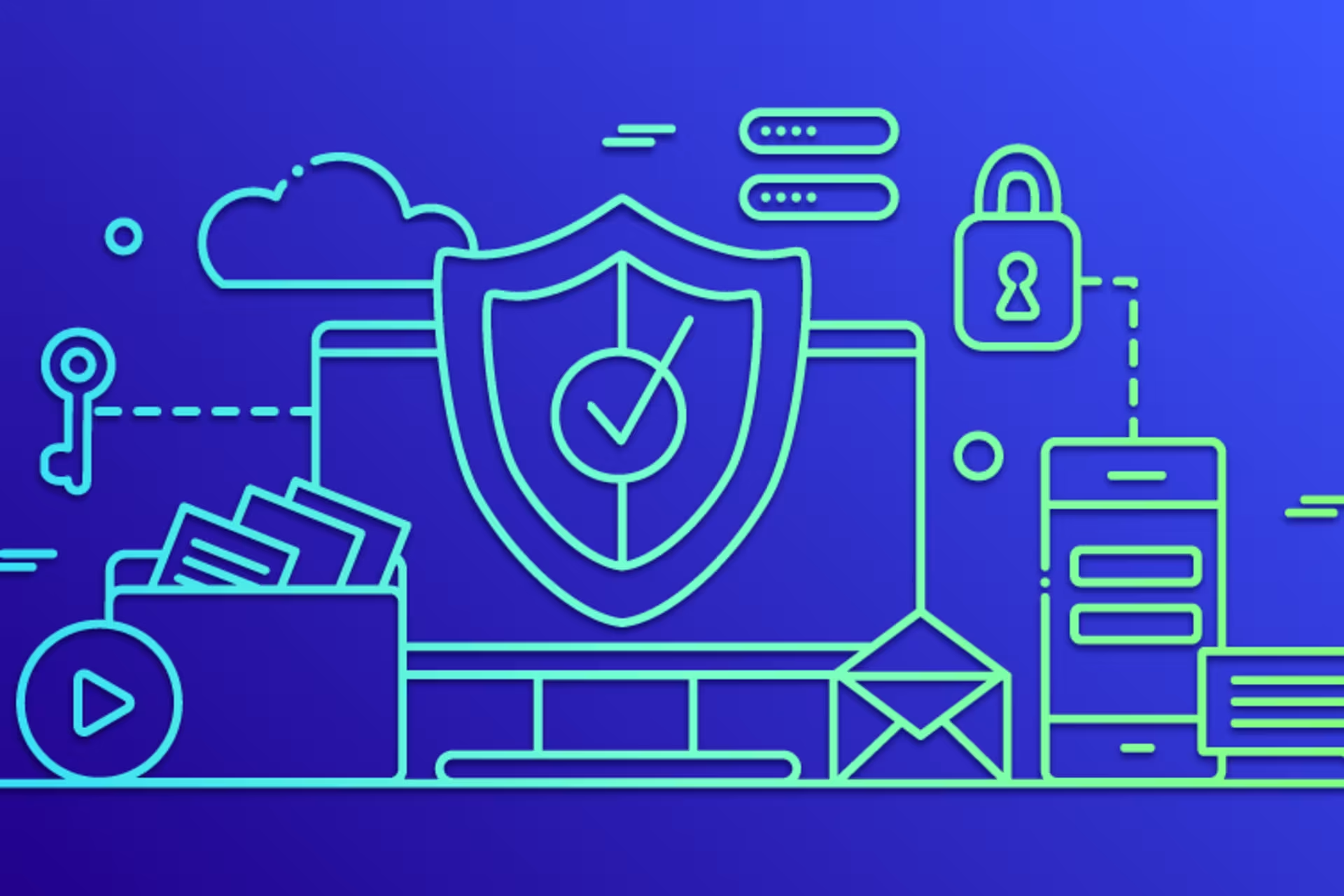Read time 5 minutes
Published on Sep 25, 2023
According to Cybersecurity Ventures, cybercrime costs are projected to soar to a staggering $10.5 trillion by 2025.(See disclaimer 1) A cyberattack encompasses any deliberate endeavor to unlawfully access a network, computer system or digital device, with the intention to steal, expose, alter, disable or destroy data, applications or other valuable assets.(See disclaimer 2)
Unfortunately, many of us overlook the significance of protecting our personal information, neglecting to adopt cybersecurity best practices in our every day lives. Global cyber threats are becoming increasingly common, with alarming reports of compromised health records, social security numbers, bank statements and more.(See disclaimer 3)
Nonetheless, certain U.S. cities may be better equipped to combat cybercrime than others. With the goal of raising awareness about cybersecurity and educating the public on cybersecurity techniques, Grand Canyon University (GCU), in collaboration with Grand Canyon Education (GCE), embarked on a journey to unveil the leading U.S. cities that offer the best cybersecurity protection. Discover the best cities that offer protection against cyberattacks, continue reading:
In this cybersecurity protection guide:
Methodology for Identifying the Best Cities That Protect Against Cybersecurity Threats
To determine which cities offer the best options for cybersecurity protection, we started by analyzing seven factors for 100 of the largest U.S. metropolitan statistical areas based on population, according to the Census.(See disclaimer 4)
We first pulled data from the sources listed in the below table for each city in our analysis. Based on the ranges associated with each factor, we translated the raw data into a score on a scale from 0 to 5, with 5 indicating the most favorable conditions for cybersecurity protection and 0 indicating the least favorable. Each factor was weighted equally.
Each of the scaled factor scores was multiplied by 2.86 for a total possible score of 100, as there are seven factors with a total possible score of 5.(See disclaimer 5) The final city score is based on the total weights (20) times the highest possible factor score (5) for a possible total score of 100. A perfect score of 100 would indicate the best city for cybersecurity technology, based on these factors. Below is a complete list of the factors analyzed, sources used and weights assigned.
| Ranking Factor | Source | Weight |
| Police Department Score | Police Scorecard(See disclaimer 6) | 2.86 |
| Online Purchase Scams | BBB Scam Tracker(See disclaimer 7) | 2.86 |
| Cybersecurity Office | Cybersecurity & Infrastructure Security Agency(See disclaimer 8) | 2.86 |
| IT and Repair Services | Yellow Pages(See disclaimer 9) | 2.86 |
| Search Interest for 'Random Password Generator' | Google Trends(See disclaimer 10) | 2.86 |
| Search Interest for 'Google Authenticator' | Google Trends(See disclaimer 10) | 2.86 |
| Search Interest for 'Two-Factor Verification' | Google Trends(See disclaimer 10) | 2.86 |
Examining Cybersecurity Defense Best Practices: Ranking Cities From Best to Worst

No. 1 Austin, Texas
Austin, Texas, places No. 1 on our list as the top city for cybersecurity technology protection with a score of 70.30 out of 100. Austin exhibits significant Google Trends search interest in terms like “random password generator” (73 out of a possible 100) and “Google Authenticator” (64 out of 100).(See disclaimer 10)
Austin is on the cutting edge of cybersecurity and holds a yearly Cybersecurity summit, which brings together C-Suite and senior executives responsible for protecting their companies’ critical infrastructures and provides them with innovative solution providers and renowned information security experts.(See disclaimer 11)
Austin also has a Cybersecurity and Infrastructure Security Agency (CISA) office, which is one of 10 regional offices across the United States.(See disclaimer 8) Each region is equipped with local and regional Protective Security Advisors (PSAs), Cyber Security Advisors (CSAs), Emergency Communications Coordinators (ECCs) and Chemical Security Inspectors (CSIs). You can find your respective region and report any cyber attacks to them.(See disclaimer 12)
No. 2 Madison, Wisconsin
Coming in No. 2 on our list is Madison, Wisconsin, with a score of 66.90 out of 100. Madison also has a CISA office location and 25.76 IT support services per 100,000 residents.(See disclaimer 8,9)
Despite its strong performance in our other rankings, it is worth noting that Madison experiences 5.58 online purchase scams per 100,000 residents.(See disclaimer 7) In Wisconsin, the Cybersecurity Center for Business offers cybersecurity education, training and resources for businesses, educational institutions and governments, which may be one way Madison is taking a proactive approach to cybersecurity technology.(See disclaimer 13)
No. 3 Columbia, South Carolina
Placing No. 3 on our list is Columbia, South Carolina, with a score of 63.10 out of 100. Columbia residents boast high Google Trends search interest for terms like “two-factor verification” (73 out of 100) and “Google Authenticator” (56 out of 100).(See disclaimer 9) The South Carolina Cyber Association hosts regular workshops and events to keep its residents abreast of cybersecurity best practices, which may be one reason why Columbia is high on our list.(See disclaimer 14)
As we delved into specific categories related to cybersecurity techniques, certain cities emerged as leaders in their respective areas. For example, Charlotte, North Carolina, secured the No. 14 position overall and boasted the highest-rated police department score of 63%.(See disclaimer 6) Over the years, the Charlotte-Mecklenburg Police Department has shared tips to combat cyber threats with their residents, which may be one reason why Charlotte secured a top spot.(See disclaimer 15)
No. 100 Birmingham, Alabama
Among the cities with significant potential for improvement in cybersecurity techniques, Birmingham, Alabama, stands at the forefront. Birmingham obtained the No. 100 spot with a score of 27.40 out of 100. The low search interest among Birmingham residents for cyber protection tools like Google Authenticator further highlights a lack of awareness and interest in this crucial area. Birmingham also has a low police department score of 38% and only 16.33 IT support services per 100,000 residents.(See disclaimer 6,9)
How Does Your City Measure up on Cybersecurity Techniques for Protection?
Curious how well your city can handle cyber threats? Check out our table to see where your city stacks up.
Adding an interesting twist, Phoenix, Arizona, (GCU’s hometown) houses a CISA cybersecurity office and demonstrates a relatively high search interest in the term "two-factor verification" (60).(See disclaimer 8,10)
Cybersecurity Best Practices: Do’s and Don’ts
With the rise of AI, remote work and cloud applications, hackers are becoming even more creative when it comes to collecting your sensitive information. No matter which city you live in, the threat of cybersecurity attacks are lurking everywhere. Did you know that merely charging your phone via a USB port could potentially expose your data to hackers? This type of cyber threat, known as “juice jacking,” occurs when malicious individuals install malware onto public charging stations, such as those found in libraries, airports and other communal spaces.(See disclaimer 16)
To be on the forefront of cybersecurity, we put together a list of do’s and don’ts you should follow when it comes to spending time online. Outsmart today’s newest cyber threats by following a few of our cybersecurity best practices below:
Closing Thoughts on The Best U.S. Cities That Offer Cybersecurity Protection
Are you eager to live in a city that prioritizes cutting-edge cybersecurity technology and defense mechanisms to ensure your online safety and protection? Better yet, do you dream of contributing to a cyber defense team that safeguards U.S. cities from cyber threats? Look no further than GCU! With our BS in Cybersecurity Degree, our BSIT with an Emphasis in Cybersecurity or our MS in Cybersecurity Management, you can embark on exciting career paths within digital forensics, security architecture designs and more. If you’re passionate about STEM, we offer a range of other cybersecurity and related degrees for you to explore.
Take the first step toward learning about cybersecurity best practices and safeguarding your privacy from malicious hackers.
Retrieved from:





